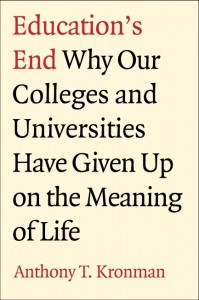Fewer students are pursuing humanities degrees today because of concern about their value in the marketplace. Indeed, the issue has become a political football, with North Carolina’s governor, Pat McCrory, among others, arguing that states should stop subsidizing certain humanities programs at pubic institutions because they don’t lead to jobs.
Colleges & universities are reacting to this kind of cost-benefit analysis with sharper arguments about the ways their offerings contribute to post-graduate life and work. Unfortunately, beyond all the arguments, the basic changes that are needed will only come when the custodians of higher education acknowledge how they’ve helped to make a liberal arts education irrelevant for most students. There are glimmers of hope, but there is little to suggest that these basic changes will be happening anytime soon.
For example, Harvard published a report last week that attempted to respond to concerns about fewer humanities majors and their poor prospects in the job market. The report said that its English and other humanities departments should “market themselves better” to undergraduates before they declare their majors while “improving their internship networks.” A Wall Street Journal article tried to bolster these modest proposals by noting that Harvard has been “for centuries a standard bearer of American letters” while, in a sidebar, identifying humanities graduates who went on to successful careers, including media magnate Sumner Redstone (Classics & Government) and Goldman Sack’s chair Lloyd Blankfein (Social Studies).
Proponents have also been more vocal about how the ideal humanities degree prepares you for the working world. One classics professor highlighted the core career competencies identified in the 2013 Job Outlook Survey from the National Association of Colleges & Employers, noting that they “correspond very strongly with the content and skills acquired through a liberal arts education,” namely: communication, teamwork, problem solving, critical thinking and organization.
University of Chicago’s president Robert Zimmer responded to students dropping out of college and going directly into business by noting that “[a]t their best, colleges and universities are themselves hothouses of innovation, a natural site and climate for translating ideas into application.” (In prior posts, I’ve also talked about when experience is the better teacher and the university as innovation hothouse.)
Wesleyan’s Michael Roth further bolsters the case by seeing higher education as “a catalytic resource that continues to energize and shape your life.”
Many seem to think that by narrowing our focus to just science and engineering, we will become more competitive. This is a serious mistake…
[I]nnovation in technology companies, automobile design, medicine or food production will not come only from isolated work in technical disciplines. Effective vaccine delivery programs, for example, require technical expertise, but they also require cultural understanding, economic planning and ethical reasoning. . .The growing field of animal studies, for example, brings together interpretative and analytic skills along with contemporary scientific research.
We should look at education not as a specific training program for a limited range of mental muscles but as a process through which one will generate some of the most important features in one’s life. It makes no sense to train people as narrowly as possible in a world going through cataclysmic changes, for you are building specific strengths that leave you merely muscle-bound, not stronger and more flexible.
We should think of education as a kind of intellectual cross-training that leads to many more things than at any one moment you could possibly know would be useful.
OK, so it’s not only skills but also qualities of mind like imagination, flexibility and the ability to grow that are the hoped-for byproducts of a liberal arts education. But is this what a humanities degree really provides today?
The same article announcing Harvard’s new report barely mentioned Wake Forest (in Governor McCrory’s most interesting state) and its integration of “personal and career development” into its curriculum. For several years now, I’ve been eavesdropping on what Wake and its champion on the issue, Andy Chan, have been up to. As it turns out, they seem to be getting at least half of it right.

At Wake, what they’re aiming for in terms of personal & career (life & work) development isn’t a service department, like a guidance counselor you have to sit down with just before you leave, but what they call an “ecosystem.”
Individual career services departments cannot shoulder the burden of educating, advising and supporting students on their own. It is crucial that other constituents (faculty, staff, parents, alumni) are trained, encouraged and motivated to help students in a variety of ways – as advisors, connectors, influencers, and mentors.
In class, in one-on-one meetings, in internships, and other interactions, these constituents are encouraged to help students to grapple with a sequence of 4 questions: “Who am I?” “What shall I do?” “How will I get there?” and “Once there, how will I be successful?”
So far, so good. It’s about the entire college or university community helping their individual students to think about, so that they can connect in an effective manner with, the post-graduate world. It’s a different focus than having faculty off on celebrity book tours or alumni looking to have buildings or basketball courts named after them. In an ecosystem like this, “constituent payback” is assisting rising generations to successfully launch.
But community isn’t enough without the right course of study.

Most humanities departments have thrown out a core curriculum based on Western thought in favor of a smorgasbord of victim studies, self-directed projects, exercises in political correctness, and field trips. Job qualities like imagination and flexibility are more likely to spring from a more comprehensive knowledge base than this, and 40 years ago a liberal arts education provided it—along with some of the raw materials for living a life with meaning and purpose.
In the cafeteria plan of higher education today, most students don’t know enough to pick what will ultimately be “good” for them. So the issue is whether the ecosystem is also willing to provide a menu “with healthier choices” that includes comprehensive exposure to our civilization’s greatest ideas and stories. It’s precisely what Anthony Kronman urges in Education’s End: Why Our Colleges and Universities Have Given Up on the Meaning of Life.
Artes liberals or liberal arts means “the skills of free person.” It’s a course of study that can be the ticket to a satisfying job and a fulfilling life. It’s what those in the forefront, like Andy Chan and Anthony Kronman, are proposing. Unfortunately, most of higher education is not even close to providing it.


